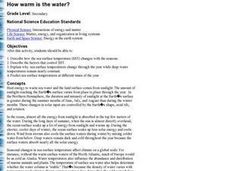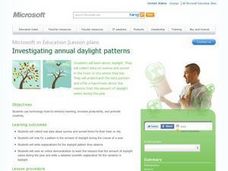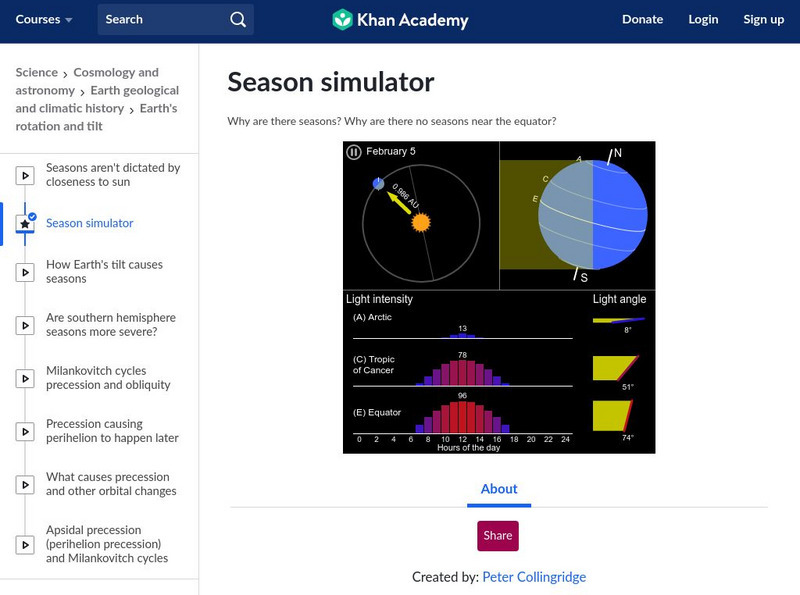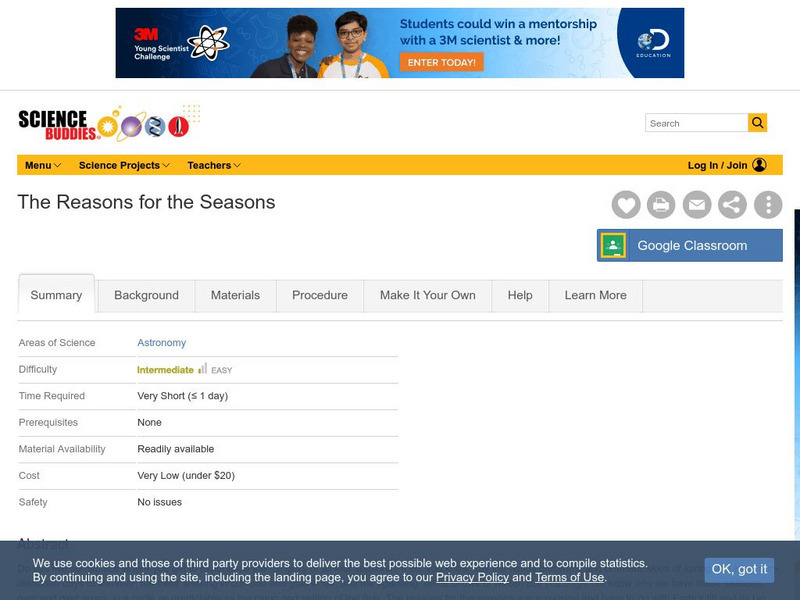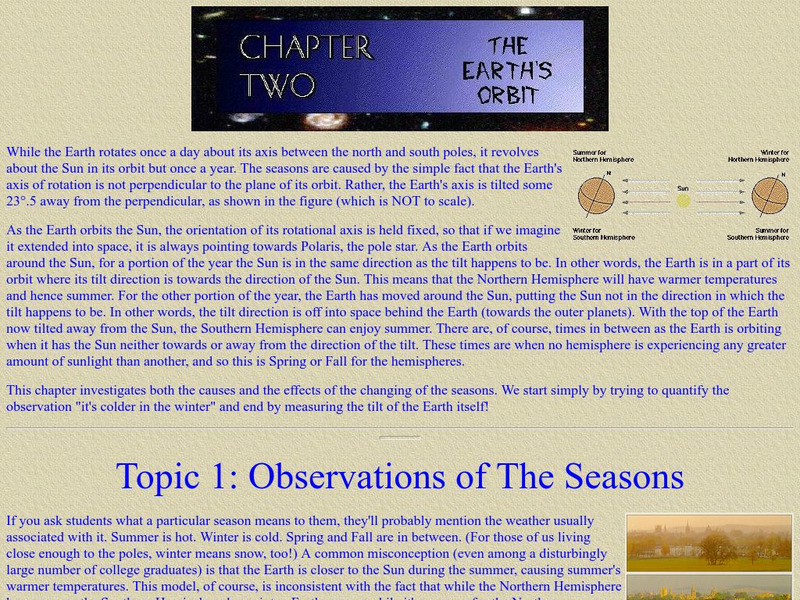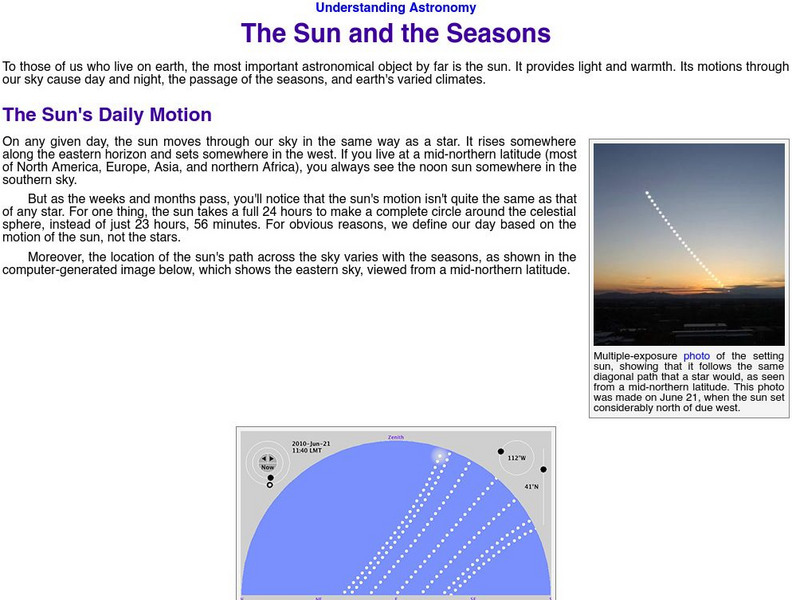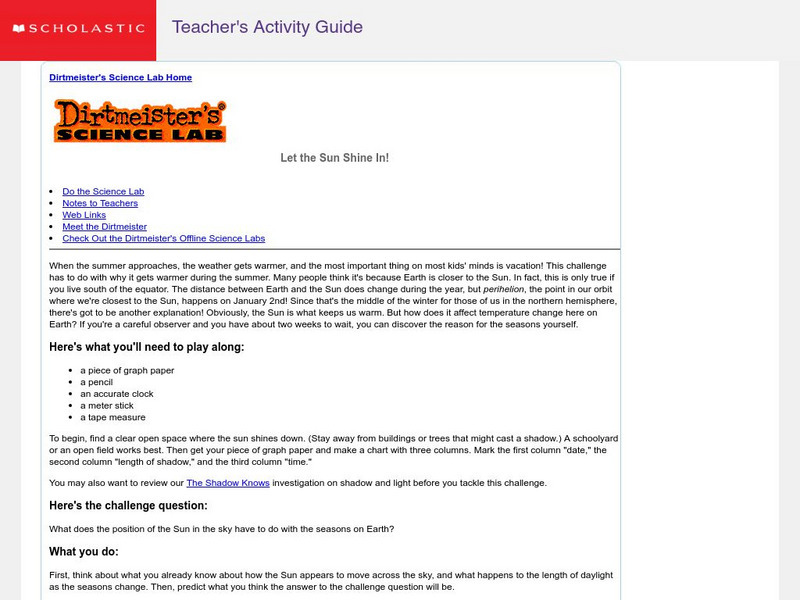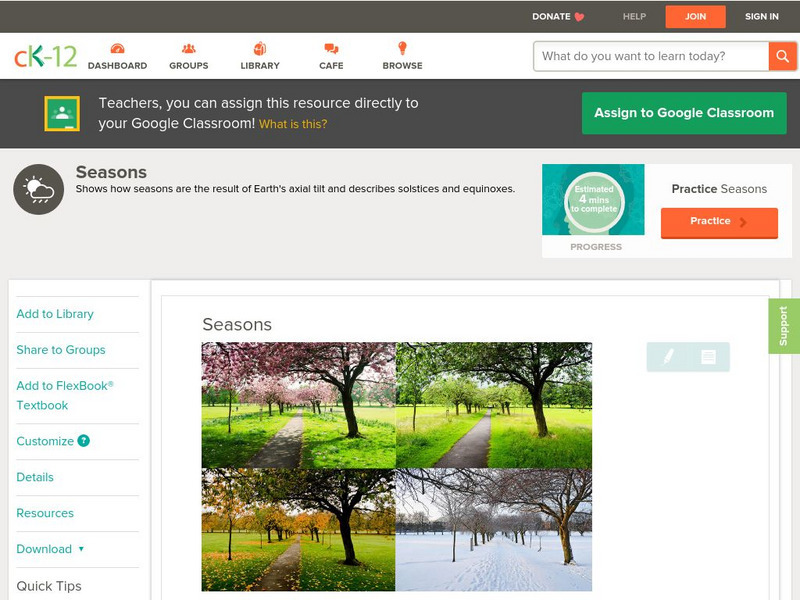Curated OER
Life Cycles
For this life cycles worksheet, students compare the life cycles of 2 different species and answer short answer questions about them. Students can choose the species to compare and then answer 6 questions.
Curated OER
Today's Weather on Mars
Students investigate the temperature and wind data locally, nationally, and internationally and compare these conditions to those on Mars. Conclusions are drawn about the differences of these conditions and the causes for the variance...
Curated OER
Graphing San Diego Tides
Students observe the tides in San Diego for one month. Using this information, they graph the tides on a chart along with the phases of the moon. They answer questions related to the graph to end the lesson.
Curated OER
Constructing a Planetarium
Students work together to create their own planetarium. They observe the night sky and make a design. They also examine constellations and paint them onto the model of the planetarium.
Curated OER
How Warm is the Water?
Students research how surface sea temperature changes throughout the year. They draw a time series of sea surface temperatures for each month of the year and a depth profile for a summer and winter month using an OceanExplorer Profiler...
Curated OER
Charlotte's Web
Students examine the story, "Charlotte's Web" in the nine lessons of this unit. As the students progress through the book, they will explore the story plot, setting, character, and the value of friendship.
Curated OER
Watershed Management
Students investigate the concept of a watershed. They conduct research into the concept using a variety of resources. Students take a field trip to a local watershed to make observations. The outcome is a report concerning the outside...
Curated OER
Sea Surface Temperature Trends of the Gulf Stream
Students explore the importance of the Gulf Stream. Using a NASA satellite images, they examine the sea surface temperature. Students collect the temperature at various locations and times. Using spreadsheet technology, they graph the...
Curated OER
Investigating daylight
students investigate a natural factor affecting their everyday lives: daylight. First, they collect data on sunrise and sunset in their hometown, create a Microsoft Office Excel chart to help them understand the data pattern, and offer a...
PBS
Pbs Learning Media: Earth in Motion: Seasons
This interactive activity from the Adler Planetarium explains the "reasons for the seasons." Featured is a game in which Earth must be properly placed in its orbit in order to send Max, the host, to different parts of the world during...
BioEd Online
Bio Ed Online: Reason for the Seasons
In this set of activities, the path the Sun takes in relation to the Earth is tracked by students on two days, with three months in between them. They will develop an understanding of what causes the seasons as they examine the effects...
Khan Academy
Khan Academy: Cosmology and Astronomy: Season Simulator
This season simulator takes Earth through an entire year cycle allowing the viewer to observe the tilt of the Earth and the intensity of the sunlight.
TED Talks
Ted: Ted Ed: Reasons for the Seasons
Why do some regions experience full-time heat while others are reckoning with frigid temperatures and snow? And why are the seasons reversed in the two hemispheres? Rebecca Kaplan explains how the shape of the Earth's orbit around the...
Science Buddies
Science Buddies: A Matter of Degrees: Tilt of Earth's Axis Affects the Seasons
In this science fair project, use a globe and a heat lamp to investigate how the angle of the Sun affects global warming. This project includes the objective, background questions, a list of all the materials you'll need, and the...
Science Buddies
Science Buddies: Project Ideas: The Reasons for the Seasons
In this astronomy science fair project, investigate how the earth's axial tilt creates seasons. The Science Buddies project ideas are set up consistently beginning with an abstract, objective, and introduction, followed by a section on...
BBC
Bb Ci Space: Earth
The BBC provides a general overview of the planet Earth. Content includes statistical information, a focus on the four seasons, moon information, and more.
Sophia Learning
Sophia: Earth and Sun
A slideshow exploring Earth's rotation and revolution around the sun. Learn that because of Earth's axis tilt we experience the seasons!
Harvard University
Eyes on the Sky, Feet on the Ground: The Earth's Orbit
Students perform many inquiry activities related to Earth's orbit. Included are recording daily temperatures, observing the sun's path over several weeks, tracking sunrise and sunset times, and angle of sunlight. Diagrams make lessons...
Other
Weber State University: The Sun and the Seasons
To those of us who live on earth, the most important astronomical object by far is the sun. This article explains how the motion of the sun through our sky cause day and night, the passage of the seasons, and earth's varied climates.
Scholastic
Scholastic: Dirtmeister's Science Lab: Let the Sun Shine In
Students graph data reflecting time of day and length of shadow, and then draw conclusions about Earth's seasons and position in relation to the Sun.
Exploratorium
Exploratorium:seasons/shadows: Investigate How Shadows Shift Throughout the Year
Ancient Chacoans used shadows to tell daily time and seasons. Build a model that demonstrates the changes in Earth's tilt that affect the length of shadows relative to the sun that determines the seasons. The lesson plan uses everyday...
National Museums Liverpool
Liverpool Museums: The Sun Tracker
This simulation allows the user to see the sun's arc in the sky anywhere in the world at any time. By changing the season settings the user can see how seasons affect the height of the sun's arc.
Oklahoma Mesonet
Oklahoma Climatological Survey: The Seasons
Find out what the seasons are and how they change. Through the use of excellent graphics, content explores the Earth's orbit around the sun and how sunlight reaches the earth at equinox and the winter solstice.
CK-12 Foundation
Ck 12: Earth Science: Seasons
[Free Registration/Login may be required to access all resource tools.] Learn how and why seasons occur.






